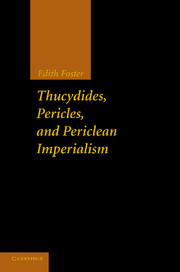Book contents
- Frontmatter
- Contents
- Acknowledgments
- List of Abbreviations
- Introduction
- 1 War Materials and Their Glory in the Archaeology
- 2 Arms and Passion
- 3 The Athenian Acme in Book One of Thucydides
- 4 Pericles in History
- 5 Pericles and Athens
- 6 Thucydides and Pericles' Final Speeches
- Bibliography
- General Index
- Index Locorum
1 - War Materials and Their Glory in the Archaeology
Published online by Cambridge University Press: 06 July 2010
- Frontmatter
- Contents
- Acknowledgments
- List of Abbreviations
- Introduction
- 1 War Materials and Their Glory in the Archaeology
- 2 Arms and Passion
- 3 The Athenian Acme in Book One of Thucydides
- 4 Pericles in History
- 5 Pericles and Athens
- 6 Thucydides and Pericles' Final Speeches
- Bibliography
- General Index
- Index Locorum
Summary
The argument of Thucydides' Archaeology has often been cited as evidence that Thucydides and his Pericles shared a positive evaluation of imperialistic warfare. It is certainly true that the Archaeology and Pericles' speeches treat many similar topics, warfare and imperialism among them. But is it equally true that Thucydides and Pericles agreed about these topics? Does the Archaeology, like Pericles in his speeches, display approval for imperial warfare and confidence in the value of imperialistic acquisition? In our approach to this question, we will pay close attention to the role of Thucydides' references to the tools of imperialism and warfare in the Archaeology.
At the same time, we will remain mindful that war materials are not the Archaeology's exclusive focus. Swords, money, ships, walls, and other materials necessary for warfare are prominent in the Archaeology, which is a history of continuous conflict. However, they are by no means the only material illustrations of Thucydides' analysis. This chapter will also attend to the evidence Thucydides brought forward to characterize the successive peoples of Greek history. This evidence is various, copious, and striking, ranging from loin clothes and golden hair brooches to the graves of Carian pirates and the (imagined) future ruins of Athens and Sparta.
The Archaeology is therefore a text rich in narrated materials. Furthermore, it offers guidance for assessing their role. The first and most important standard for judging the role of narrated materials in the Archaeology is offered by the lessons learned from Thucydides' account of ancient events.
- Type
- Chapter
- Information
- Thucydides, Pericles, and Periclean Imperialism , pp. 8 - 43Publisher: Cambridge University PressPrint publication year: 2010



